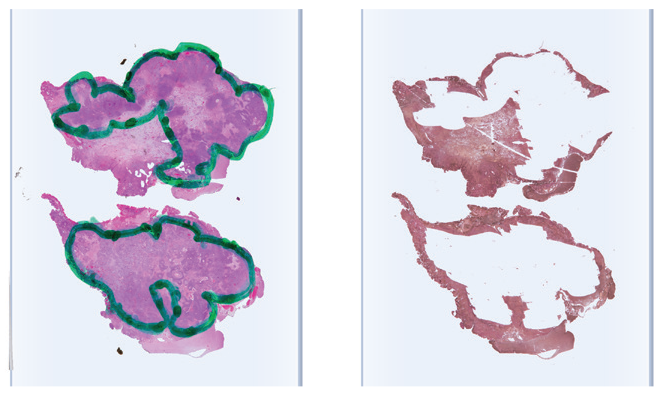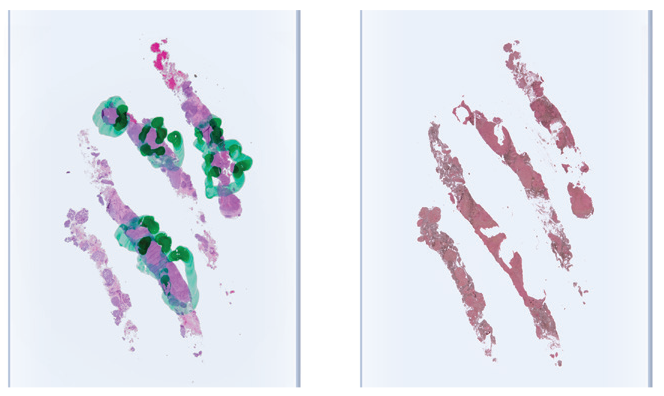Tissue Profiling
Comprehensive Molecular Tissue Profiling of DNA, RNA and Proteins
Caris tissue-based profiling utilizes the most advanced technologies and comprehensive approach to analyze DNA, RNA and proteins to reveal a molecular blueprint that guides more precise and individualized treatment decisions that leads to improved patient outcomes.
Whole Exome Sequencing
SNVs
Indels
CNAs
Karyotyping
Viruses
Whole Transcriptome Sequencing
Gene Fusions
Variant Transcripts
Gene Expressions
Proteins
Tumor-Relevant Protein Biomarkers
The Most Comprehensive and Trusted Molecular Profile Available
- Unmatched expertise with hundreds of thousands of clinical cases
- Coverage of all 23,000 genes
- DNA
- RNA
- Proteins
- Enhanced with Artificial Intelligence
- Genomic signatures (HRD, gLOH, MSI, TMB)
- Other (HLA Genotyping)
- Proteins
- Immunohistochemistry (IHC)
- Other
- Chromogenic In Situ Hybridization (CISH)
- Microdissection
- AI-powered signatures
- Rapid Turnaround: 10-14 days
- Broad insurance coverage: in-network with many insurance plans, including Medicare
Caris Molecular Profiling Menu by Region
United States
Review and download the Caris molecular profiling testing menu for United States cases.
New York
Review and download the Caris molecular profiling testing menu for New York state cases.
International*
Review and download the Caris molecular profiling testing menu for International cases.
*Excluding EEA, EU, CH countries.
Caris Molecular Profiling Menu by Region
International & US
New York
European Union (EU)
Please complete the form below to have a Caris Scientific Rep (Molecular Science Liaison) contact you directly.
"*" indicates required fields
Tissue Microdissection

Microdissection isolates specific tumor cells for testing and reduces non-cancer material diluting the tissue section.
Example 1
- Tumor is ~70% of total tissue section
- Within the marked tumor area, 60% tumor nuclei cells vs 40% normal cells

With Microdissection
- Test ONLY the tissue within the marked tumor area
- The final tumor DNA composition is 60%
Without Microdissection
- Test all the tissue
- The final tumor DNA composition is 42% (70% x 60% = 42%)
Example 2
- Tumor is ~10% of total tissue section
- Within the marked tumor area, 20% tumor nuclei cells vs 80% normal cells

With Microdissection
- Test ONLY the tissue within the marked tumor area
- The final tumor DNA composition is 20%
Without Microdissection
- Test all the tissue
- The final tumor DNA composition is 2% (10% x 20% = 2%) and CANNOT be used (sample not sufficient for testing)
* In a 2018 comparison of Tumor Mutational Burden (TMB) in NSCLC the Foundation Medicine Checkmate 2271 success rate2 was 60.9% compared to a success rate of 85.1% for Caris3, due in large part to the tissue microdissection enrichment at Caris Life Sciences.
- Hellmann MD, Ciuleanu T-E, Pluzanski A, et al. Nivolumab plus ipilimumab in lung cancer with a high tumor mutational burden. N Engl J Med 2018;378:2093-104. DOI: 10.1056/NEJMoa1801946
- TMB-Success rate = TMB Result Generated / Sufficient Tissue for Testing
- Internal Data, NSCLC testing results in 2018. TMB-Success rate = TMB Result Generated / Sufficient Tissue for Testing
Order Profiling
Place an order today for a comprehensive, personalized Caris profiling report.